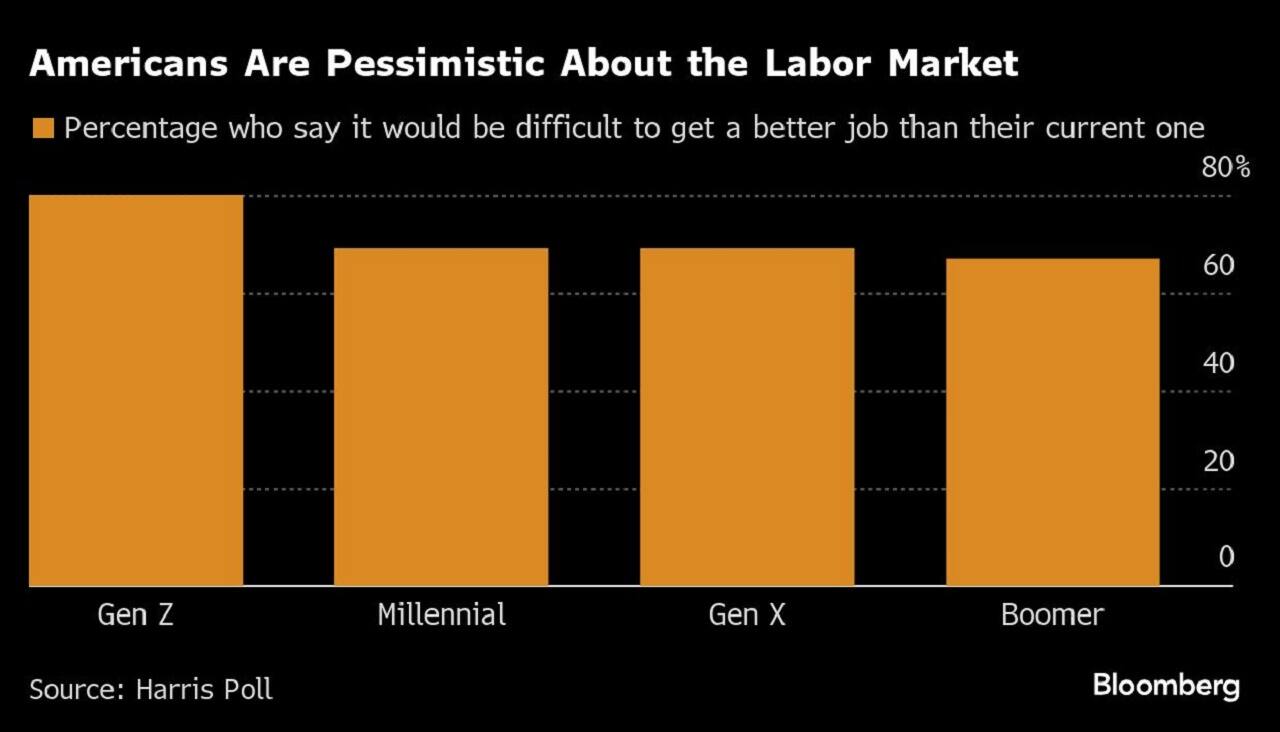



This was supposed to be the year the white-collar job market got hot again.
Instead, job seekers are coming up empty-handed and employers are cutting at the fastest pace in years. Those with stable seats are mostly holding on tight.
Call it a new era of uncertainty. President Donald Trump’s flip-flopping tariff policy is sending shockwaves through the economy, his administration has implemented mass firings at federal agencies and giants like Meta Platforms Inc., JPMorgan Chase & Co. and Goldman Sachs are cutting positions. All the while, recession fears are dragging down financial markets.
It’s fueling a sense of pessimism among the average white-collar worker. More than 70% of Americans think it’s difficult to find a better job than their current one, according to a recent Harris Poll survey for Bloomberg News. And 75% say employers have more leverage in the job market than employees do.
“This is a big time of change in general,” said Maggie Mistal, a career consultant and executive coach based in New York and Florida. “I've seen people who are like, ‘I’m going to stay where I am because I don't know what's going to happen’ — they might not be raking in the cash but they're stable.”

Uncertainty over interest rates, the US presidential election and the health of the economy effectively froze the American labor market last year as companies curtailed hiring and prospective job seekers took a wait-and-see approach. The thinking went that 2025 would bring clarity on those issues. And some data points, like rising job openings and quits, indicate a resilient labor market.
But people like Sabrina Swarthout are not seeing it. The 27-year-old in Mammoth Lakes, California has been looking for a job in digital marketing for the past month, with little luck. She compares the search to swiping on a dating app — lots of ghosting, red flags and sugarcoated rejections. After applying to some 200 positions, Swarthout is considering broadening her search to different industries.
“I feel like I’m in a blender,” Swarthout said. “It’s so discouraging to see how there’s thousands of us in the same boat.”
Despite a relatively low unemployment rate across the economy as a whole, white-collar job seekers say open roles are hard to come by. The hiring rate is currently 3.4%, among the lowest in the past decade, while job openings are declining. It’s pushing some to stay put.
Jacob Harris, a 36-year-old in New York, has been working in the same web development position since 2017 and has no plans to leave.
When his peers were switching jobs and notching big pay raises during the red-hot job market in 2022, he admits that he did feel some fear of missing out. But now, especially after watching a couple of those peers get laid off, he's glad he stayed put.
"I think I value stability a lot more than other people in my field do," he said. "I don't feel like I'm in danger of losing my position, and it's a low-stress work environment."
Frustrating Search
Some of the frustration among job seekers may have to do with a dramatic shift in expectations over a short period. During the pandemic-era war for talent, staffers got acclimated to fast promotions, raises and opportunities to jump to different employers. Those expectations are no longer being met.
One client of Peter Allen, an executive and career coach at Allen Strategies in New York City, has been waiting for a promotion longer than expected. He is growing frustrated.
“We’ve had such volatility over the past few years that I think particularly for younger people, they may not have a realistic expectation of what normal career promotion looks like,” Allen said.
That’s leading many to feel like they are stagnating. Almost 40% employees feel stuck professionally and 8% feel they’re falling behind, compared to 53% who think they’re getting ahead, according to the Harris Poll.

“If you don’t have growth opportunities, that completely reduces motivation,” said Allison Task, a career coach based in New Jersey. “You’re just going through the motions.”
Then there’s the general state of pessimism among those looking for work. The opportunities for graduates from even the most prestigious business schools are decreasing, and private-sector wage growth is declining as well.
Meanwhile, the constant stream of stories about layoffs in the federal government and private sector affect employee perceptions, according to Peter Cappelli, professor of management at the University of Pennsylvania’s Wharton School.
“Rate of change matters a lot to people, not so much the level,” Cappelli said. “The talk over the last quarter has all been about layoffs. And even though the total number of layoffs is probably not so much, it’s just all over the news.”
Discover the latest Business News, Sensex, and Nifty updates. Obtain Personal Finance insights, tax queries, and expert opinions on Moneycontrol or download the Moneycontrol App to stay updated!
Find the best of Al News in one place, specially curated for you every weekend.
Stay on top of the latest tech trends and biggest startup news.